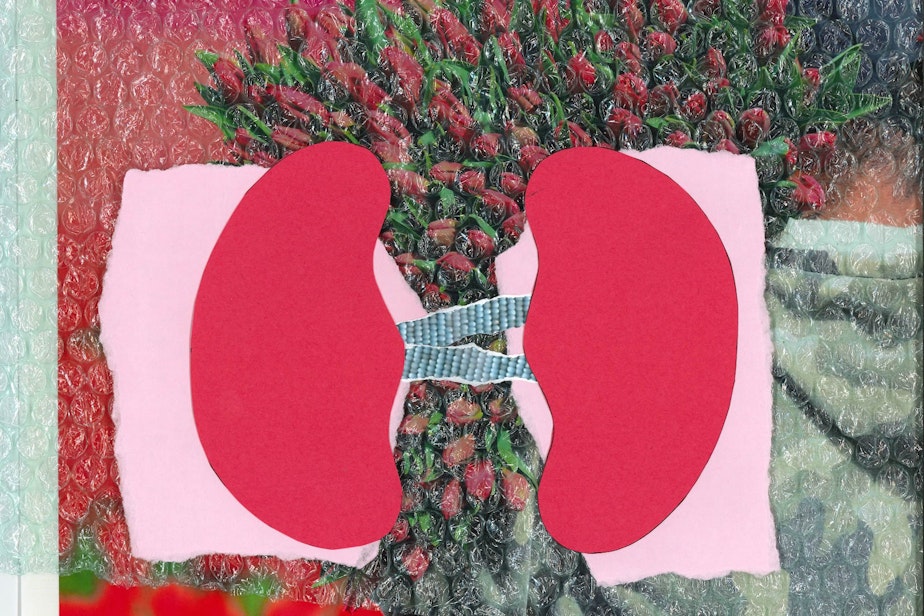Gonzalo needs a kidney. But he can't get one because he's undocumented

It was noon, and Gonzalo was lying down when I arrived at his apartment in south King County. His wife Ricarda walked down a long, dark hallway to get him.
“I was lying down because I felt really dizzy,” Gonzalo said in Spanish. “I can’t enjoy the day, go out, because I’m always unwell.”
Gonzalo is 60 years old. He and Ricarda moved to the U.S. from Mexico about 30 years ago. We’re not using their last names because they’re undocumented.
Ten years ago, Gonzalo’s kidneys failed. Since then, he’s gotten sicker and sicker.
For undocumented immigrants, health care can sometimes be hard to get. Emergency room care is available. But ongoing care for chronic conditions is another story. Across the country, there are about 6,500 undocumented immigrants with kidney failure. What kind of care they get depends on where they live. Washington used to offer more options for undocumented patients with kidney disease until budget cuts a few years ago.
Five years ago, Gonzalo got so sick he quit his job as a painter.
Sponsored
“I used to pay the rent. I paid for everything,” Gonzalo said. “We had a car. We had food. We had an apartment. But I got sick and everything changed.”
Now, Gonzalo and Ricarda live with one of their daughters in her apartment.
“I get depressed that I can’t do anything,” Gonzalo said. “If I try to do anything, I get out of breath. I don’t have any strength.”
Ricarda has also quit her job cleaning houses so she can take care of Gonzalo full time.
What Gonzalo has needed since his kidneys failed is dialysis. Dialysis is a machine that does what working kidneys should do: filter the body’s blood, removing toxins and excess fluid. That process takes about four hours, and it needs to happen three times a week for a patient like Gonzalo to feel relatively normal.
Sponsored
In most states, undocumented immigrants can only get dialysis in the emergency room. But Washington is one of seven states that pays for regularly-scheduled dialysis for undocumented immigrants.
That’s through a program called AEM: Alien Emergency Medical Programs. It’s part of Washington’s Medicaid.
“AEM pays for two things,” Leah Haseley, a nephrologist, or kidney doctor, said. “They pay for dialysis for undocumented people, and they pay for chemotherapy for undocumented people as well.”
Dialysis has kept Gonzalo alive—but he’s not doing well.
“People have to understand that dialysis is a form of life support,” Dr. Haseley said. Kidney disease “is a chronic illness with a sort of time bomb feeling associated with it. There’s a very high risk of sudden death.”
Sponsored
“I would just be very, very worried if I had a child on dialysis,” she added. “Every day on dialysis is a day closer to death.”
Dr. Haseley said a better choice for Gonzalo would be a kidney transplant, for two reasons: health and money.
With a transplant, he could live three to fifteen years longer than on dialysis.
And a transplant would cost the state far less.
Washington used to have a program that covered transplants for undocumented immigrants in some cases—but legislators ended that program in 2002 to deal with a budget shortfall.
Sponsored
Paying for transplants for undocumented immigrants is controversial. Some say it would encourage people to come to the U.S. for that purpose.
Gonzalo’s family would need hundreds of thousands of dollars to pay for his transplant. They don’t have that kind of money.
But he likely has a kidney donor.
“In terms of the kidney, there’s no problem,” he said, “because my daughters tell me that they will see who’s a match, and whoever it is will give me a kidney. They tell me, ‘Papá, don’t worry about that.’”
Undocumented immigrants donate about 3 percent of organs in the U.S. But it’s incredibly rare for them to be on the receiving end, because they can’t pay.
Sponsored
Gonzalo’s wife Ricarda said she’s taken to buying scratch tickets.
She said, “I tell my husband, ‘If I win the lottery, I won’t think twice. I’m going to get you a kidney.’”




